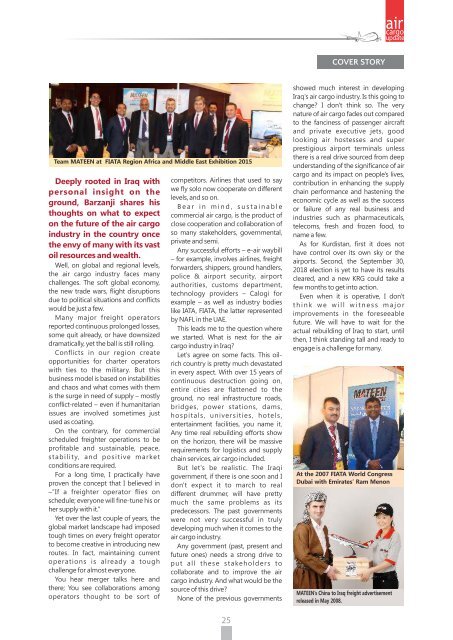You also want an ePaper? Increase the reach of your titles
YUMPU automatically turns print PDFs into web optimized ePapers that Google loves.
COVER STORY<br />
Team MATEEN at FIATA Region Africa and Middle East Exhibition 2015<br />
Deeply rooted in Iraq with<br />
personal insight on the<br />
ground, Barzanji shares his<br />
thoughts on what to expect<br />
on the future of the air cargo<br />
industry in the country once<br />
the envy of many with its vast<br />
oil resources and wealth.<br />
Well, on global and regional levels,<br />
the air cargo industry faces many<br />
challenges. The soft global economy,<br />
the new trade wars, flight disruptions<br />
due to political situations and conflicts<br />
would be just a few.<br />
Many major freight operators<br />
reported continuous prolonged losses,<br />
some quit already, or have downsized<br />
dramatically, yet the ball is still rolling.<br />
Conflicts in our region create<br />
opportunities for charter operators<br />
with ties to the military. But this<br />
business model is based on instabilities<br />
and chaos and what comes with them<br />
is the surge in need of supply – mostly<br />
conflict-related – even if humanitarian<br />
issues are involved sometimes just<br />
used as coating.<br />
On the contrary, for commercial<br />
scheduled freighter operations to be<br />
profitable and sustainable, peace,<br />
stability, and positive market<br />
conditions are required.<br />
For a long time, I practically have<br />
proven the concept that I believed in<br />
–”If a freighter operator flies on<br />
schedule; everyone will fine-tune his or<br />
her supply with it.”<br />
Yet over the last couple of years, the<br />
global market landscape had imposed<br />
tough times on every freight operator<br />
to become creative in introducing new<br />
routes. In fact, maintaining current<br />
operations is already a tough<br />
challenge for almost everyone.<br />
You hear merger talks here and<br />
there; You see collaborations among<br />
operators thought to be sort of<br />
competitors. Airlines that used to say<br />
we fly solo now cooperate on different<br />
levels, and so on.<br />
B e a r i n m i n d , s u s t a i n a b l e<br />
commercial air cargo, is the product of<br />
close cooperation and collaboration of<br />
so many stakeholders, governmental,<br />
private and semi.<br />
Any successful efforts – e-air waybill<br />
– for example, involves airlines, freight<br />
forwarders, shippers, ground handlers,<br />
police & airport security, airport<br />
authorities, customs department,<br />
technology providers – Calogi for<br />
example – as well as industry bodies<br />
like IATA, FIATA, the latter represented<br />
by NAFL in the UAE.<br />
This leads me to the question where<br />
we started. What is next for the air<br />
cargo industry in Iraq?<br />
Let's agree on some facts. This oilrich<br />
country is pretty much devastated<br />
in every aspect. With over 15 years of<br />
continuous destruction going on,<br />
entire cities are flattened to the<br />
ground, no real infrastructure roads,<br />
bridges, power stations, dams,<br />
hospitals, universities, hotels,<br />
entertainment facilities, you name it.<br />
Any time real rebuilding efforts show<br />
on the horizon, there will be massive<br />
requirements for logistics and supply<br />
chain services, air cargo included.<br />
But let's be realistic. The Iraqi<br />
government, if there is one soon and I<br />
don't expect it to march to real<br />
different drummer, will have pretty<br />
much the same problems as its<br />
predecessors. The past governments<br />
were not very successful in truly<br />
developing much when it comes to the<br />
air cargo industry.<br />
Any government (past, present and<br />
future ones) needs a strong drive to<br />
put all these stakeholders to<br />
collaborate and to improve the air<br />
cargo industry. And what would be the<br />
source of this drive?<br />
None of the previous governments<br />
showed much interest in developing<br />
Iraq's air cargo industry. Is this going to<br />
change? I don't think so. The very<br />
nature of air cargo fades out compared<br />
to the fanciness of passenger aircraft<br />
and private executive jets, good<br />
looking air hostesses and super<br />
prestigious airport terminals unless<br />
there is a real drive sourced from deep<br />
understanding of the significance of air<br />
cargo and its impact on people's lives,<br />
contribution in enhancing the supply<br />
chain performance and hastening the<br />
economic cycle as well as the success<br />
or failure of any real business and<br />
industries such as pharmaceuticals,<br />
telecoms, fresh and frozen food, to<br />
name a few.<br />
As for Kurdistan, first it does not<br />
have control over its own sky or the<br />
airports. Second, the September 30,<br />
2018 election is yet to have its results<br />
cleared, and a new KRG could take a<br />
few months to get into action.<br />
Even when it is operative, I don't<br />
t h i n k w e w i l l w i t n e s s m a j o r<br />
improvements in the foreseeable<br />
future. We will have to wait for the<br />
actual rebuilding of Iraq to start, until<br />
then, I think standing tall and ready to<br />
engage is a challenge for many.<br />
At the 2007 FIATA World Congress<br />
Dubai with Emirates’ Ram Menon<br />
MATEEN’s China to Iraq freight advertisement<br />
released in May 2008.

















